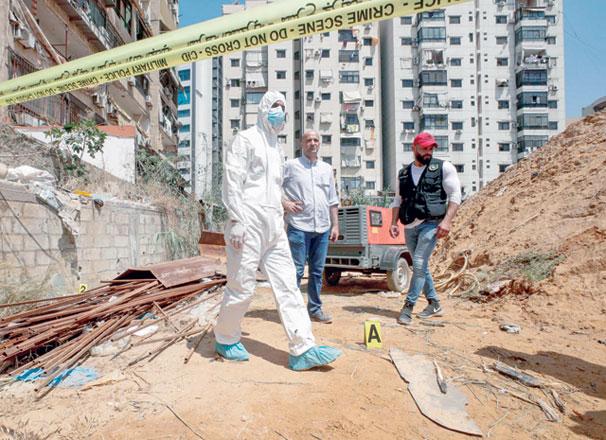You are here
Lebanon condemns Israel aggression after anti-Hizbollah drone attack
By AFP - Aug 25,2019 - Last updated at Aug 25,2019

This photo taken on Sunday shows forensic investigators of Lebanon's military intelligence inspecting the scene where two drones came down in the vicinity of a media centre of the Shiite Hizbollah movement earlier in the day (AFP photo)
BEIRUT — Lebanon condemned an Israeli "aggression" on Sunday after two drones targeted the Beirut stronghold of the Iran-backed Shiite group Hizbollah, warning of further regional tensions.
Hizbollah, considered a terrorist organisation by Israel and the United States, is a major political actor in Lebanon and a key backer of the Damascus regime in war-torn Syria.
The early morning incident in south Beirut came hours after Israel said it had conducted air strikes in neighbouring Syria “to prevent an Iranian force from launching an attack” on Israel.
A war monitor said the air raids in the southeast of Damascus killed five fighters, including two Hizbollah members and an Iranian.
The Shiite movement and Israel have upped their belligerent rhetoric in recent months, after fighting several wars, the last of them in 2006.
Lebanon's army said "two drones belonging to the Israeli enemy violated Lebanese airspace... over the southern suburbs of Beirut", a Hizbollah stronghold in the capital.
"The first fell while the second exploded in the air causing material damage," he said.
A Hizbollah spokesman, Mohamed Afif, insisted his movement did not shoot down either of the two drones, but said the second aircraft had damaged a Hizbollah media centre in a residential building.
It "was laden with explosives and exploded causing huge damage to the media centre", Afif said, adding that shards from shattered window panes had caused "minor injuries".
'Threat to regional stability'
"The first drone did not explode and it is now in the possession of Hizbollah which is analysing it."
He said the drone had a target, but that it had not yet been determined.
An AFP correspondent saw security forces deployed in the area of the incident.
Hizbollah chief Hassan Nasrallah, who has repeatedly warned Israel against carrying out attacks, was expected to speak at a pre-scheduled event later on Sunday.
Israeli forces declined to comment on the Lebanese claim about the drones, but Israeli commentators have suggested the drones could be Iranian.
“Another possibility is that the... drones that fell were not Israeli, but rather Iranian,” military correspondent Amos Harel wrote in Haaretz newspaper.
Lebanon’s President Michel Aoun, an ally of Hizbollah, said the drone incursion targeted “stability and peace in Lebanon and the region”.
Prime Minister Saad Hariri, who is one of the Shiite group’s most prominent political opponents, condemned a “blatant attack on Lebanon’s sovereignty”.
“This new aggression... forms a threat to regional stability and an attempt to push the situation towards more tension,” he said.
Hariri also charged that it was in violation of UN Security Council Resolution 1701 that ended the 2006 war between Israel and Lebanon’s Hizbollah.
That 33-day war killed 1,200 people in Lebanon, mostly civilians, and 160 in Israel.
US Secretary of State Mike Pompeo later on Sunday called Hariri to stress the “necessity to avoid any escalation”, the premier’s office said.
‘Iran has no immunity anywhere’
Just hours before, the Israeli military claimed it had been able late Saturday to thwart an attempt by an Iranian force to attack northern Israel with drones using explosives.
Since the beginning of the crisis in Syria in 2011, Israel has conducted hundreds of strikes in Syria, most of them against what it says are Iranian and Hizbollah targets, but it rarely acknowledges its actions so swiftly.
Military spokesman Jonathan Conricus said the Israeli attack struck in Aqraba, southeast of Damascus, and targeted “terror targets and military facilities belonging to the Quds force [of Iran’s elite Revolutionary Guard] as well as Shiite militias”.
Conricus said while Iranian forces had launched rockets and missiles at Israel from Syria three times during 2018, the use of “kamikaze” attack drones was a new and “different tactic”.
“We’ve been tracking the Quds force attempt for... multiple weeks,” he said.
On Saturday, the military believed “that another attempted attack was imminent and that was what led to the decision to attack”, he claimed.
The Syrian Observatory for Human Rights, a Britain-based monitor, said five fighters were killed, but a high-ranking official in Tehran denied Iranian positions had been hit.
A Syrian military source quoted by the state news agency SANA said anti-aircraft defences detected “enemy targets” late Saturday and responded.
Just minutes after Israel announced its raid, Netanyahu hailed what he termed a “major operational effort” in thwarting an attack.
“Iran has no immunity anywhere,” Netanyahu said. “Our forces operate in every sector against the Iranian aggression.”
Related Articles
DAMASCUS — A drone was shot down on Saturday in Quneitra province in southern Syria, the second such incident in 48 hours, state media said.
OCCUPIED JERUSALEM — Israeli Prime Minister Benjamin Netanyahu on Tuesday warned Lebanon, Hizbollah's chief and the head of Iran's elite Qud
KIRYAT SHMONA — The Lebanese army said Israel fired 40 rockets into southern Lebanon on Sunday after the Hizbollah movement claimed it destr












